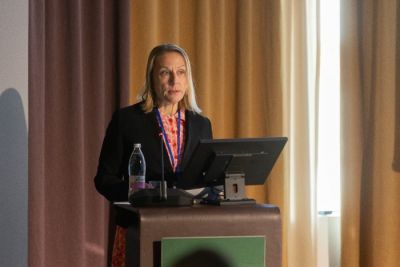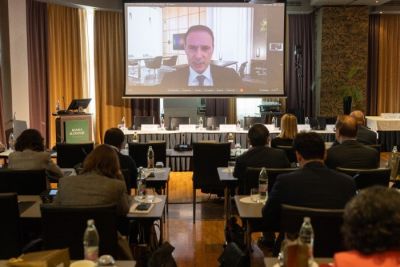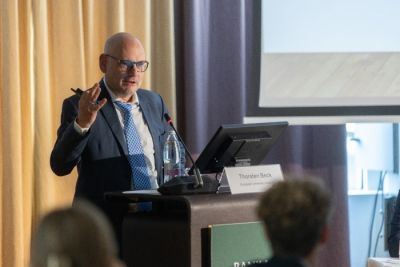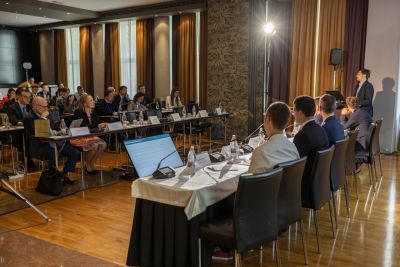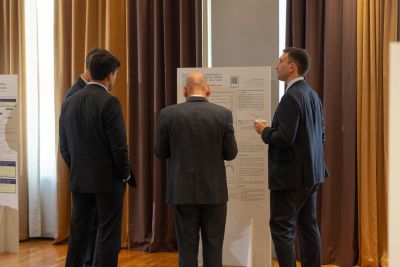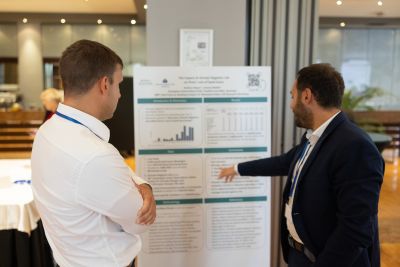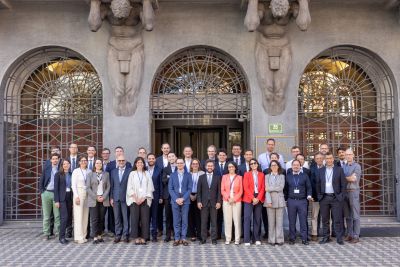Banka Slovenije hosted the 11th research workshop of the Monetary Policy Committee Task Force on Banking Analysis for Monetary Policy. The workshop was organised in cooperation with the ECB and brought together numerous representatives from national European central banks as well as academics.
The opening remarks were delivered by the Task Force Chair, Carlo Altavilla (ECB), and Vice-Governor of Banka Slovenije, Tina Žumer. In the keynote address, Professor Thorsten Beck from the Florence School of Banking and Finance discussed the challenges of banking regulation and supervision in a changing world. The presentations at the workshop explored, from both theoretical and empirical perspectives, various channels of monetary policy transmission, with a focus on the role of banks and other financial institutions.
Programme
Thursday, 18 September
Opening remarks: Tina Žumer, Vice Governor, Banka Slovenije
Welcome address: Carlo Altavilla, Head of Monetary Analysis Division / Task Force Chair, European Central Bank
Session 1
Macro-financial conditions and loan pricing
Session chair: Matic Petriček, Banka Slovenije
Financial conditions and the macroeconomy: a two-factor view: Marco Lombardi*, BIS; Cristina Manea, BIS; Andreas Schrimpf, BIS and CEPR
Discussant: Sebastian Bredl, Deutsche Bundesbank
Monetary Policy Tightening and SME Credit Demand Substitution: Supriya Kapoor*, Trinity College Dublin; Michael Mahony, Central Bank of Ireland; Anuj Pratap Singh, Central Bank of Ireland
Discussant: David Kremer, Banque centrale du Luxembourg
Monetary Policy, Uncertainty, and Credit Supply: Eric Vansteenberghe*, Banque de France
Session 2
Central bank balance sheet
Session chair: Lorenzo Burlon, European Central Bank
Integrating Balance Sheet Policy into Monetary Policy Conditions: Benoit Mojon, Bank for International Settlements; Phurichai Rungcharoenkitkul*, Bank for International Settlements; Dora Xia, Bank for International Settlements
Quantitative easing and quantitative tightening: the money channel: Michael Kumhof*, Bank of England; Mauricio Salgado-Moreno, Bank of England
Session 3
Households
Session chair: Miguel Boucinha, European Central Bank
Mortgage Liquidity Shocks and Corporate Lending: Evidence from Household-Initiated Bank Balance Sheet Adjustment: Sumit Agarwal, National University of Singapore; Sergio Mayordomo, Banco de España; María Rodriguez-Moreno*, Banco de España; Emanuele Tarantino, Luiss Guido Carli, EIEF, CEPR, and European Commission
Household Borrowing and Monetary Policy Transmission: Post-Pandemic Insights from Nine European Credit Registers: Tamás Briglevics*, Central Bank of Hungary; Olivier De Jonghe, Konstantins Benkovskis, Karolis Bielskis, Diana Bonfim, Margherita Bottero, Martin Cesnak, Mantas Dirma, Marina Emiris, Pálma Filep-Mosberger, Valentin Jouvanceau, Nicholas Kaiser, Dmitry Khametshin, Tibor Lalinsky, Viola M. Grolmusz, Laura Moretti, Arturs Janis Nikitins, Angelo Nunnari, María Rodriguez-Moreno, Elitsa Stefanova, Lajos Tamás Szabó, Karlis Vilerts, Sujiao Emma Zhao
MortgAge Premia in the Euro Area: Yunus Aksoy, Birkbeck University of London; Davide Malacrino, European Central Bank and International Monetary Fund; Giulio Nicoletti*, European Central Bank
Discussant: Alin Andrieș, Alexandru Ioan Cuza Univ. and Institute for Economic Forecasting
Keynote address
Chair: Carlo Altavilla, European Central Bank and CEPR
Regulating and supervising banks in a new brave world: Thorsten Beck, European University Institute, Director of Florence School of Banking & Finance
Friday, 19 September
Session 4
Bank lending channel
Session chair: Franziska Maruhn, European Central Bank
Does credit supply lead loan demand? An empirical investigation: Lucia Esposito*, Banca d’Italia; Elena Collina, Banca d’Italia
Discussant: Marco Lombardi, Bank of International Settlements
Identifying Heterogeneous Supply and Demand Shocks in European Credit Markets: Olivier De Jonghe*, European Central Bank, National Bank of Belgium, Ghent University, and Tilburg University; Daniel Lewis, University College London
The Heterogeneous Bank Lending Channel of Monetary Policy: Jorge Abad*, Banco de España; Saki Bigio, UCLA; Salomón García-Villegas, Banco de España; Joël Marbet, Banco de España; Galo Nuño, Banco de España, CEPR and CEMFI
Session 5
Monetary policy transmission in a changing environment
Session chair: María T. Valderrama, Österreichische Nationalbank
A Geopolitical Shock to Bank Assets and Monetary Policy Transmission: Falko Fecht, Deutsche Bundesbank; Stefan Greppmair, Deutsche Bundesbank; Björn Imbierowicz*, Deutsche Bundesbank
Monetary policy, State-dependent capital requirements and the role of Non-Bank Financial Intermediaries: Manuel Gloria, Bank of England; Chiara Punzo*, Bank of England
Session 6
Portfolio allocation decisions of firms and households
Session chair: Arjana Brezigar, Banka Slovenije
Enhancing Transmission of Monetary Policy Through Deposit Market Competition: Bono Beriša*, Hrvatska narodna banka; Ivan Mužić, Hrvatska narodna banka; Jurica Zrnc, Hrvatska narodna banka
Discussant: Stephen Kho, De Nederlansche Bank
Pricing Risk or Rationing Credit? Bank Behavior in a Tightening Monetary Cycle: Matjaž Volk*, Banka Slovenije
Monetary policy at the margin: Diana Bonfim, Banco de Portugal; Miguel García-Posada*, Banco de España; Sergio Mayordomo, Banco de España; Maria Rodríguez Moreno, Banco de España
Poster Sessions - Detailed list of participating papers
Lighting the Shadows: Central Bank Policy Transmission through Banks and Non-Banks: Nicolò Bandera, Bank of England and Banque de France; Kristina Bluwstein, Bank of England; Mauricio Salgado-Moreno, Bank of England; Jacob Stevens*, Bank of England and University of St Andrews
Bank relationships and monetary policy transmission in the euro area: Gabriele Di Filippo, Banque Centrale du Luxembourg; Gastón Andrés Giordana, Banque Centrale du Luxembourg; Bob Kaempff, Banque Centrale du Luxembourg; David Kremer*, Banque Centrale du Luxembourg; Léonore Lebouteiller, Banque Centrale du Luxembourg
Peering beyond the veil: A dissection of aggregate bank lending rate movements into pricing and composition effects using credit-level data: Paul Reimers*, Deutsche Bundesbank; Henrike Michaelis, Deutsche Bundesbank
The Effects of a Large Energy Price Shock on Firm Credit: Niels Framroze Møller, Danmarks Nationalbank; Johannes Pöschl*, European Central Bank
Corporate Debt Composition, Access to Credit, and Monetary Policy: Adam Gulan, Bank of Finland; Aino Silvo*, Bank of Finland
Measuring the Stability of the Banking System: Capital and Liquidity at Risk with Solvency-Liquidity Interactions: Giovanni Covi, Bank of England; Tihana Škrinjarić*, Bank of England
Insurance corporations’ balance sheets, financial stability and monetary policy: Christoph Kaufmann, European Central Bank; Jaime Leyva, Banco de Portugal; Manuela Storz*, European Central Bank
Climate-Related Financial Policy and Systemic Risk: Alin Andrieş*, Alexandru Ioan Cuza University of Iași and Institute for Economic Forecasting, Romanian Academy; Steven Ongena, University of Zurich, Swiss Finance Institute, KU Leuven, NTNU Business School, and CEPR; Nicu Sprincean, Alexandru Ioan Cuza University of Iași and National Institute for Economic Research, Romanian Academy
The Impact of Climate Litigation Risk on Firms’ Cost of Bank Loans: Andreas Beyer, European Central Bank; Lorenzo Nobile*, European Central Bank

